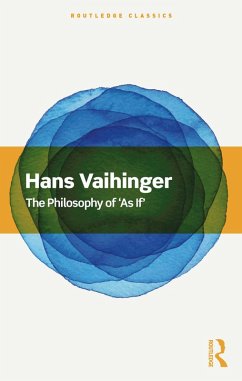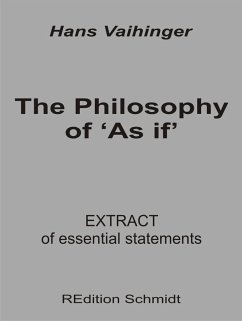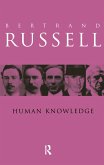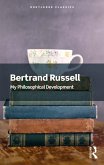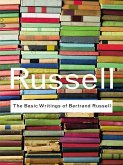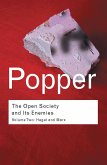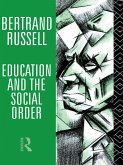Hans Vaihinger
The Philosophy of 'As If' (eBook, PDF)
20,95 €
20,95 €
inkl. MwSt.
Sofort per Download lieferbar

10 °P sammeln
20,95 €
Als Download kaufen

20,95 €
inkl. MwSt.
Sofort per Download lieferbar

10 °P sammeln
Jetzt verschenken
Alle Infos zum eBook verschenken
20,95 €
inkl. MwSt.
Sofort per Download lieferbar
Alle Infos zum eBook verschenken

10 °P sammeln
Hans Vaihinger
The Philosophy of 'As If' (eBook, PDF)
- Format: PDF
- Merkliste
- Auf die Merkliste
- Bewerten Bewerten
- Teilen
- Produkt teilen
- Produkterinnerung
- Produkterinnerung

Bitte loggen Sie sich zunächst in Ihr Kundenkonto ein oder registrieren Sie sich bei
bücher.de, um das eBook-Abo tolino select nutzen zu können.
Hier können Sie sich einloggen
Hier können Sie sich einloggen
Sie sind bereits eingeloggt. Klicken Sie auf 2. tolino select Abo, um fortzufahren.

Bitte loggen Sie sich zunächst in Ihr Kundenkonto ein oder registrieren Sie sich bei bücher.de, um das eBook-Abo tolino select nutzen zu können.
Widely acknowledged today as a philosophical masterwork, this Routledge Classics edition includes a new foreword by Michael Rosenthal, which provides fascinating and important background to Vaihinger's life and the legacy of The Philosophy of 'As If'.
- Geräte: PC
- mit Kopierschutz
- eBook Hilfe
Andere Kunden interessierten sich auch für
![The Philosophy of 'As If' (eBook, ePUB) The Philosophy of 'As If' (eBook, ePUB)]() Hans VaihingerThe Philosophy of 'As If' (eBook, ePUB)20,95 €
Hans VaihingerThe Philosophy of 'As If' (eBook, ePUB)20,95 €![The Philosophy of 'As if' (eBook, ePUB) The Philosophy of 'As if' (eBook, ePUB)]() Hans VaihingerThe Philosophy of 'As if' (eBook, ePUB)0,99 €
Hans VaihingerThe Philosophy of 'As if' (eBook, ePUB)0,99 €![Human Knowledge: Its Scope and Value (eBook, PDF) Human Knowledge: Its Scope and Value (eBook, PDF)]() Bertrand RussellHuman Knowledge: Its Scope and Value (eBook, PDF)47,95 €
Bertrand RussellHuman Knowledge: Its Scope and Value (eBook, PDF)47,95 €![My Philosophical Development (eBook, PDF) My Philosophical Development (eBook, PDF)]() Bertrand RussellMy Philosophical Development (eBook, PDF)19,95 €
Bertrand RussellMy Philosophical Development (eBook, PDF)19,95 €![The Basic Writings of Bertrand Russell (eBook, PDF) The Basic Writings of Bertrand Russell (eBook, PDF)]() Bertrand RussellThe Basic Writings of Bertrand Russell (eBook, PDF)20,95 €
Bertrand RussellThe Basic Writings of Bertrand Russell (eBook, PDF)20,95 €![The Open Society and its Enemies (eBook, PDF) The Open Society and its Enemies (eBook, PDF)]() Karl PopperThe Open Society and its Enemies (eBook, PDF)14,95 €
Karl PopperThe Open Society and its Enemies (eBook, PDF)14,95 €![Education and the Social Order (eBook, PDF) Education and the Social Order (eBook, PDF)]() Bertrand RussellEducation and the Social Order (eBook, PDF)23,95 €
Bertrand RussellEducation and the Social Order (eBook, PDF)23,95 €-
-
-
Widely acknowledged today as a philosophical masterwork, this Routledge Classics edition includes a new foreword by Michael Rosenthal, which provides fascinating and important background to Vaihinger's life and the legacy of The Philosophy of 'As If'.
Dieser Download kann aus rechtlichen Gründen nur mit Rechnungsadresse in A, B, BG, CY, CZ, D, DK, EW, E, FIN, F, GR, HR, H, IRL, I, LT, L, LR, M, NL, PL, P, R, S, SLO, SK ausgeliefert werden.
Produktdetails
- Produktdetails
- Verlag: Taylor & Francis
- Seitenzahl: 400
- Erscheinungstermin: 30. Mai 2021
- Englisch
- ISBN-13: 9781000385854
- Artikelnr.: 61579195
- Verlag: Taylor & Francis
- Seitenzahl: 400
- Erscheinungstermin: 30. Mai 2021
- Englisch
- ISBN-13: 9781000385854
- Artikelnr.: 61579195
- Herstellerkennzeichnung Die Herstellerinformationen sind derzeit nicht verfügbar.
Hans Vaihinger (1852-1933) was born near Tübingen in Germany. He made important contributions to epistemology, the philosophy of science and mathematics, and to the historiography of philosophy. Vaihinger produced groundbreaking work on Kant's philosophy, as well as one of the first serious philosophical commentaries on Nietzsche. He is best known as the father of the philosophical theory of fictionalism, which he sets out in his most famous book, The Philosophy of 'As If', and his work also influenced the philosophical movement of pragmatism.
Foreword to the Routledge Classics Edition Michael Rosenthal General
Introduction Part 1: Basic Principles General Introductory Remarks on
Fictional Constructs A. The Enumeration and Division of Scientific Fictions
B. The Logical Theory of Scientific Fictions C. Contributions to the
History and Theory of Fictions D. Consequences for the Theory of Knowledge
Part 2: Amplified Study of Special Problems 1. Artificial Classification 2.
Further Artificial Classifications 3. Adam Smith's Method in Political
Economy 4. Bentham's Method in Political Science 5. Abstractive Fictional
Methods in Physics and Psychology 6. Condillac's Imaginary Statue 7.
Lotze's 'Hypothetical Animal' 8. Other Examples of Fictitious Isolation 9.
The Fiction of Force 10. Matter and Materialism as Mental Accessories 11.
Abstract Concepts as Fictions 12. General Ideas as Fictions 13.
Summational, Nominal, and Substitutive Fictions 14. Natural Forces and
Natural Laws as Fictions 15. Schematic Fictions 16. Illustrative Fictions
17. The Atomic Theory as a Fiction 18. Fictions in Mathematical Physics 19.
The Fiction of Pure Absolute Space 20. Surface, Line, Point, etc., as
Fictions 21. The Fiction of the Infinitely Small 22. The History of the
Infinitesimal Fiction 23. The Meaning of the' As If' Approach 24. The
Fictive Judgment 25. The Fiction contrasted with the Hypothesis Part 3:
Historical Confirmations A. Kant's Use of the 'As If' Method B. Forberg,
The Originator of the Fichtean Atheism-Controversy, and his Religion of
As-If C. Lange's 'Standpoint of the Ideal' D. Nietzsche and his Doctrine of
Conscious Illusion. Subject Index Index of Names
Introduction Part 1: Basic Principles General Introductory Remarks on
Fictional Constructs A. The Enumeration and Division of Scientific Fictions
B. The Logical Theory of Scientific Fictions C. Contributions to the
History and Theory of Fictions D. Consequences for the Theory of Knowledge
Part 2: Amplified Study of Special Problems 1. Artificial Classification 2.
Further Artificial Classifications 3. Adam Smith's Method in Political
Economy 4. Bentham's Method in Political Science 5. Abstractive Fictional
Methods in Physics and Psychology 6. Condillac's Imaginary Statue 7.
Lotze's 'Hypothetical Animal' 8. Other Examples of Fictitious Isolation 9.
The Fiction of Force 10. Matter and Materialism as Mental Accessories 11.
Abstract Concepts as Fictions 12. General Ideas as Fictions 13.
Summational, Nominal, and Substitutive Fictions 14. Natural Forces and
Natural Laws as Fictions 15. Schematic Fictions 16. Illustrative Fictions
17. The Atomic Theory as a Fiction 18. Fictions in Mathematical Physics 19.
The Fiction of Pure Absolute Space 20. Surface, Line, Point, etc., as
Fictions 21. The Fiction of the Infinitely Small 22. The History of the
Infinitesimal Fiction 23. The Meaning of the' As If' Approach 24. The
Fictive Judgment 25. The Fiction contrasted with the Hypothesis Part 3:
Historical Confirmations A. Kant's Use of the 'As If' Method B. Forberg,
The Originator of the Fichtean Atheism-Controversy, and his Religion of
As-If C. Lange's 'Standpoint of the Ideal' D. Nietzsche and his Doctrine of
Conscious Illusion. Subject Index Index of Names
Foreword to the Routledge Classics Edition Michael Rosenthal General Introduction Part 1: Basic Principles General Introductory Remarks on Fictional Constructs A. The Enumeration and Division of Scientific Fictions B. The Logical Theory of Scientific Fictions C. Contributions to the History and Theory of Fictions D. Consequences for the Theory of Knowledge Part 2: Amplified Study of Special Problems 1. Artificial Classification 2. Further Artificial Classifications 3. Adam Smith's Method in Political Economy 4. Bentham's Method in Political Science 5. Abstractive Fictional Methods in Physics and Psychology 6. Condillac's Imaginary Statue 7. Lotze's 'Hypothetical Animal' 8. Other Examples of Fictitious Isolation 9. The Fiction of Force 10. Matter and Materialism as Mental Accessories 11. Abstract Concepts as Fictions 12. General Ideas as Fictions 13. Summational, Nominal, and Substitutive Fictions 14. Natural Forces and Natural Laws as Fictions 15. Schematic Fictions 16. Illustrative Fictions 17. The Atomic Theory as a Fiction 18. Fictions in Mathematical Physics 19. The Fiction of Pure Absolute Space 20. Surface, Line, Point, etc., as Fictions 21. The Fiction of the Infinitely Small 22. The History of the Infinitesimal Fiction 23. The Meaning of the' As If' Approach 24. The Fictive Judgment 25. The Fiction contrasted with the Hypothesis Part 3: Historical Confirmations A. Kant's Use of the 'As If' Method B. Forberg, The Originator of the Fichtean Atheism-Controversy, and his Religion of As-If C. Lange's 'Standpoint of the Ideal' D. Nietzsche and his Doctrine of Conscious Illusion. Subject Index Index of Names
Foreword to the Routledge Classics Edition Michael Rosenthal General
Introduction Part 1: Basic Principles General Introductory Remarks on
Fictional Constructs A. The Enumeration and Division of Scientific Fictions
B. The Logical Theory of Scientific Fictions C. Contributions to the
History and Theory of Fictions D. Consequences for the Theory of Knowledge
Part 2: Amplified Study of Special Problems 1. Artificial Classification 2.
Further Artificial Classifications 3. Adam Smith's Method in Political
Economy 4. Bentham's Method in Political Science 5. Abstractive Fictional
Methods in Physics and Psychology 6. Condillac's Imaginary Statue 7.
Lotze's 'Hypothetical Animal' 8. Other Examples of Fictitious Isolation 9.
The Fiction of Force 10. Matter and Materialism as Mental Accessories 11.
Abstract Concepts as Fictions 12. General Ideas as Fictions 13.
Summational, Nominal, and Substitutive Fictions 14. Natural Forces and
Natural Laws as Fictions 15. Schematic Fictions 16. Illustrative Fictions
17. The Atomic Theory as a Fiction 18. Fictions in Mathematical Physics 19.
The Fiction of Pure Absolute Space 20. Surface, Line, Point, etc., as
Fictions 21. The Fiction of the Infinitely Small 22. The History of the
Infinitesimal Fiction 23. The Meaning of the' As If' Approach 24. The
Fictive Judgment 25. The Fiction contrasted with the Hypothesis Part 3:
Historical Confirmations A. Kant's Use of the 'As If' Method B. Forberg,
The Originator of the Fichtean Atheism-Controversy, and his Religion of
As-If C. Lange's 'Standpoint of the Ideal' D. Nietzsche and his Doctrine of
Conscious Illusion. Subject Index Index of Names
Introduction Part 1: Basic Principles General Introductory Remarks on
Fictional Constructs A. The Enumeration and Division of Scientific Fictions
B. The Logical Theory of Scientific Fictions C. Contributions to the
History and Theory of Fictions D. Consequences for the Theory of Knowledge
Part 2: Amplified Study of Special Problems 1. Artificial Classification 2.
Further Artificial Classifications 3. Adam Smith's Method in Political
Economy 4. Bentham's Method in Political Science 5. Abstractive Fictional
Methods in Physics and Psychology 6. Condillac's Imaginary Statue 7.
Lotze's 'Hypothetical Animal' 8. Other Examples of Fictitious Isolation 9.
The Fiction of Force 10. Matter and Materialism as Mental Accessories 11.
Abstract Concepts as Fictions 12. General Ideas as Fictions 13.
Summational, Nominal, and Substitutive Fictions 14. Natural Forces and
Natural Laws as Fictions 15. Schematic Fictions 16. Illustrative Fictions
17. The Atomic Theory as a Fiction 18. Fictions in Mathematical Physics 19.
The Fiction of Pure Absolute Space 20. Surface, Line, Point, etc., as
Fictions 21. The Fiction of the Infinitely Small 22. The History of the
Infinitesimal Fiction 23. The Meaning of the' As If' Approach 24. The
Fictive Judgment 25. The Fiction contrasted with the Hypothesis Part 3:
Historical Confirmations A. Kant's Use of the 'As If' Method B. Forberg,
The Originator of the Fichtean Atheism-Controversy, and his Religion of
As-If C. Lange's 'Standpoint of the Ideal' D. Nietzsche and his Doctrine of
Conscious Illusion. Subject Index Index of Names
Foreword to the Routledge Classics Edition Michael Rosenthal General Introduction Part 1: Basic Principles General Introductory Remarks on Fictional Constructs A. The Enumeration and Division of Scientific Fictions B. The Logical Theory of Scientific Fictions C. Contributions to the History and Theory of Fictions D. Consequences for the Theory of Knowledge Part 2: Amplified Study of Special Problems 1. Artificial Classification 2. Further Artificial Classifications 3. Adam Smith's Method in Political Economy 4. Bentham's Method in Political Science 5. Abstractive Fictional Methods in Physics and Psychology 6. Condillac's Imaginary Statue 7. Lotze's 'Hypothetical Animal' 8. Other Examples of Fictitious Isolation 9. The Fiction of Force 10. Matter and Materialism as Mental Accessories 11. Abstract Concepts as Fictions 12. General Ideas as Fictions 13. Summational, Nominal, and Substitutive Fictions 14. Natural Forces and Natural Laws as Fictions 15. Schematic Fictions 16. Illustrative Fictions 17. The Atomic Theory as a Fiction 18. Fictions in Mathematical Physics 19. The Fiction of Pure Absolute Space 20. Surface, Line, Point, etc., as Fictions 21. The Fiction of the Infinitely Small 22. The History of the Infinitesimal Fiction 23. The Meaning of the' As If' Approach 24. The Fictive Judgment 25. The Fiction contrasted with the Hypothesis Part 3: Historical Confirmations A. Kant's Use of the 'As If' Method B. Forberg, The Originator of the Fichtean Atheism-Controversy, and his Religion of As-If C. Lange's 'Standpoint of the Ideal' D. Nietzsche and his Doctrine of Conscious Illusion. Subject Index Index of Names
